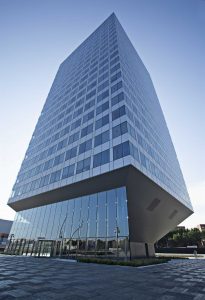(Extracts from the founding charter and statutes)
Ideology
Under the premiss of working towards SUSTAINABILITY and RATIONALISATION of the whole intervention process in the country, it is necessary that the work of all the actors involved in the sector be directed towards it and, thus, the professional work of its practitioners. We believe this should be guided by the following principles:
- The permanent objective of quality and excellence
- The premise of the correlation between building, urban planning, and the user
- The aim of ongoing enhancements to the final urban and building product
We also work towards extending this ideology to other actors to find common ground and move forward together along this path. For this reason, the Chamber intends to permanently establish the necessary bridges of dialogue with the executive and legislative bodies of the Administration, with public and private developers, as well as with all the business and professional organisations linked to the sector.
Professional aims
- Ensure the suitability and viability of all investments through consultancy, management and executive leadership of the planning, project and execution processes of construction works
- Pursue suitability of projects in terms of urban planning and construction solutions, the materials chosen, and the construction processes undertaken
- Ensure the quality of the project, also as a contractual document
- Consult on, lead and manage the tendering process
- Offer the best guarantee of management, leadership and supervision of construction works
- Constantly seek to capitalise and share the experience and information of our participation in the process
Corporate aims
- Represent, in accordance with the principles expressed in the FOUNDING CHARTER, all the affiliated companies in the promotion and defence of their professional, labour, economic, social and cultural interests, both individually and as a group. As well as by participating in labour relations
- Encourage solidarity among the affiliated companies and their professionals through the development and creation of common services of a cultural, training and assistance nature
- Plan appropriate actions to achieve improvements for the sector and the companies and individuals concerned, and in particular the promotion and dissemination of their skills
- Maintain the necessary contact and relations with other similar organisations, of any territorial scope, with the aim of providing mutual collaboration and also to exchange experiences in professional, trade union relations or any other field that will benefit the association and its member companies
- Carry out employer activity, characterised by the existence of another party related to the holder of the right for a service relationship and to whom it is exercised, through the expression of a series of rights such as those of collective labour bargaining, adoption of measures for collective and individual labour conflicts, social dialogue, and institutional participation in public bodies of the public labour administrations
- Where appropriate, form links with other organisations with the same functional scope but with a wider geographical scope, and/or to form federations or confederations under the conditions established by the legal system


